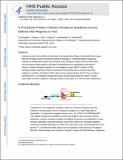A Processive Protein Chimera Introduces Mutations across Defined DNA Regions In Vivo
Author(s)
Moore, Christopher Lawrence; Papa, Louis John; Shoulders, Matthew D.
DownloadAccepted version (1.042Mb)
Terms of use
Metadata
Show full item recordAbstract
Laboratory time scale evolution in vivo relies on the generation of large, mutationally diverse gene libraries to rapidly explore biomolecule sequence landscapes. Traditional global mutagenesis methods are problematic because they introduce many off-target mutations that are often lethal and can engender false positives. We report the development and application of the MutaT7 chimera, a potent and highly targeted in vivo mutagenesis agent. MutaT7 utilizes a DNA-damaging cytidine deaminase fused to a processive RNA polymerase to continuously direct mutations to specific, well-defined DNA regions of any relevant length. MutaT7 thus provides a mechanism for in vivo targeted mutagenesis across multi-kb DNA sequences. MutaT7 should prove useful in diverse organisms, opening the door to new types of in vivo evolution experiments.
Date issued
2018-07Department
Massachusetts Institute of Technology. Department of ChemistryJournal
Journal of the American Chemical Society
Publisher
American Chemical Society (ACS)
Citation
Moore, Christopher L. et al. "A Processive Protein Chimera Introduces Mutations across Defined DNA Regions In Vivo." Journal of the American Chemical Society 140, 37 (July 2018): 11560–11564 © 2018 American Chemical Society
Version: Author's final manuscript
ISSN
0002-7863
1520-5126